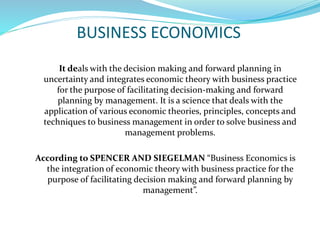The Intersection of Technology and Business and Economics in Today’s World
The Intersection of Technology and Business and Economics in Today’s World
Blog Article
Comprehending Economic Concepts for Better Service Decision-Making
In the facility landscape of contemporary business, a detailed understanding of financial concepts can dramatically improve decision-making processes. By taking a look at aspects such as market structures and consumer actions, organizations can customize their techniques to align with competitive dynamics and consumer needs. Furthermore, insights right into need elasticity and possibility costs provide a structure for enhancing source allotment. Nevertheless, the application of these financial concepts commonly exposes unforeseen obstacles and opportunities that can redefine calculated methods. What implications do these insights hold for the future of service approach?
The Fundamentals of Economic Theory
Financial concept functions as the foundation for understanding how individuals and companies choose in the existence of deficiency. At its core, economic theory takes a look at the appropriation of restricted sources to please limitless desires. This essential principle of scarcity requires trade-offs, compelling decision-makers to examine the costs and advantages connected with various options.
Both key branches of economic theory are macroeconomics and microeconomics. Microeconomics concentrates on private agents, such as consumers and companies, evaluating their actions and interactions in details markets. It stresses principles like supply and demand, rate flexibility, and market equilibrium, which are critical for recognizing exactly how prices are identified and exactly how resources are distributed.
Conversely, macroeconomics takes a look at the economic climate overall, resolving broader concerns such as rising cost of living, joblessness, and economic development. It provides insights right into systemic phenomena that impact all economic agents, directing policymakers in crafting efficient financial strategies.
Eventually, a strong grounding in financial theory is necessary for effective company decision-making. By recognizing the principles of shortage, trade-offs, and market characteristics, companies can better browse complex settings and make informed choices that enhance their competitive benefit.
Trick Economic Indicators
Secret financial indications work as vital tools for evaluating the health and instructions of an economy, offering important understandings for service decision-making. These indicators are measurable steps that mirror the financial efficiency and can be classified into leading, lagging, and coincident indications.
Leading signs, such as consumer confidence indexes and stock exchange fads, predict future economic activity, enabling companies to prepare for changes in the marketplace. Delaying indicators, like unemployment prices and corporate earnings, give understandings into the economic situation's previous performance, helping companies to examine long-term trends. Coincident indicators, such as GDP growth and retail sales, vary all at once with the economic climate, supplying a real-time photo of financial problems.
Recognizing these indications makes it possible for organizations to make informed choices regarding financial investments, resource allowance, and tactical planning. By closely keeping track of these essential economic indicators, companies can navigate uncertainties and place themselves effectively in the ever-changing financial landscape, eventually enhancing their decision-making procedures and long-term success.

Market Frameworks and Dynamics
Understanding market frameworks and dynamics is crucial for organizations intending to grow in competitive atmospheres. Market frameworks, broadly categorized into perfect competitors, monopolistic competition, oligopoly, and monopoly, substantially affect prices approaches, item differentiation, and competitive behavior. Each structure provides one-of-a-kind challenges and possibilities that can determine a company's calculated direction.
Oligopolies, defined by a couple of dominant gamers, lead to interdependent decision-making; companies must very carefully consider rivals' actions to their actions. Syndicates exist when a solitary company manages the market, resulting in maximum rates power but usually bring in regulatory scrutiny.
Comprehending these dynamics allows organizations to anticipate market fads, adjust methods, and maximize source allotment. Additionally, acknowledging how external variables like modern technology and law influence these structures can improve critical preparation. By grasping market frameworks and characteristics, firms can make informed decisions, eventually improving their affordable setting and driving lasting growth.
Consumer Habits Insights
Consumer habits plays an essential duty in shaping organization approaches and outcomes. Recognizing how consumers make acquiring choices, their preferences, and the factors influencing their habits can significantly boost a firm's capacity to fulfill market needs. Secret understandings right into customer habits can be acquired from examining demographics, psychographics, and behavioral patterns.
Group variables such as age, revenue, gender, and education level give a foundational understanding of target audience. Psychographics dive much deeper, checking out consumers' mindsets, values, and way of lives, which can affect brand name commitment and product assumption. Behavior insights, such as buying frequency and action to promotions, are indispensable for customizing advertising initiatives.
In addition, exterior elements like economic problems, social trends, and technical improvements likewise influence customer choices. Throughout economic declines, customers might prioritize important products over luxury things, altering need patterns.
Using Business Economics to Technique
Insights got from consumer behavior are important in developing reliable service techniques. By leveraging financial principles, companies can better comprehend market characteristics, enhance resource appropriation, and enhance affordable placing. Evaluating need elasticity, for example, enables firms to adjust find more rates strategies to take full advantage of earnings while staying eye-catching to consumers.
Furthermore, recognizing market segmentation enables companies to customize their offerings, guaranteeing they fulfill the particular needs and preferences of diverse customer teams. Business and Economics. This targeted approach improves consumer satisfaction and fosters brand loyalty

Incorporating game concept right into strategic planning also provides insights right into affordable behavior, enabling firms to prepare for right here competing activities and design counter-strategies efficiently.

Verdict
Finally, a detailed understanding of financial principles substantially boosts company decision-making. By checking out market structures, examining customer actions, and evaluating crucial economic signs, companies can create efficient strategies that align with market demands. The application of ideas such as demand elasticity and chance expenses even more help in maximizing source allocation and investment decisions. Ultimately, incorporating these financial theories promotes improved critical choices, helping with far better expectancy of market patterns and competitive activities, therefore driving success.
In the complicated landscape of contemporary business, a thorough understanding of economic concepts can significantly boost decision-making processes.Leading indications, such as customer self-confidence indexes and stock market patterns, forecast future financial task, enabling recommended you read organizations to prepare for changes in the market. By carefully checking these vital financial indicators, services can navigate uncertainties and position themselves properly in the ever-changing economic landscape, inevitably boosting their decision-making procedures and long-lasting success.
By leveraging financial principles, businesses can better recognize market characteristics, enhance source allotment, and improve competitive placing.In final thought, a detailed understanding of economic concepts dramatically improves company decision-making.
Report this page